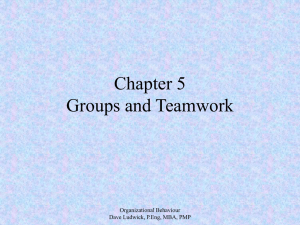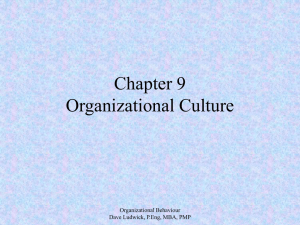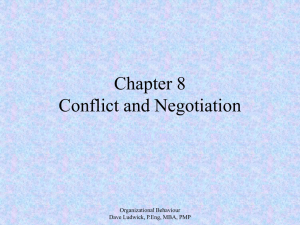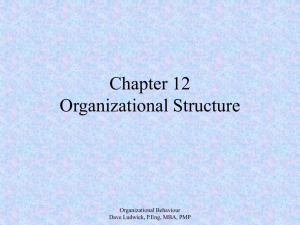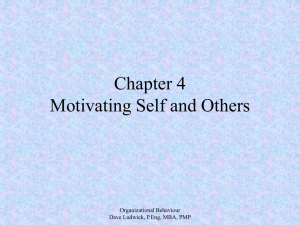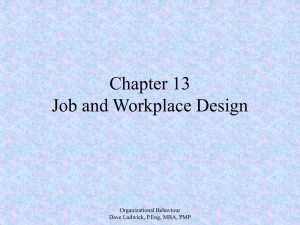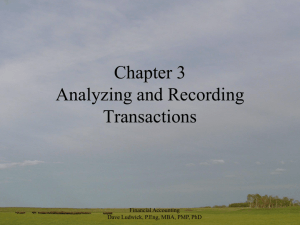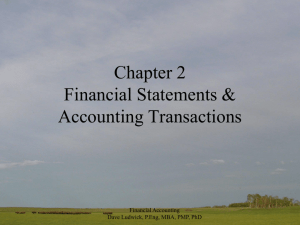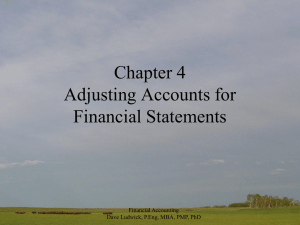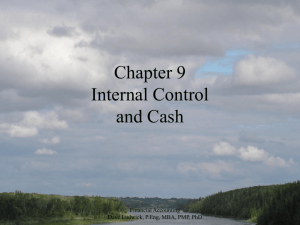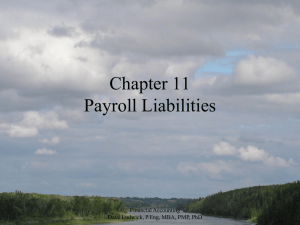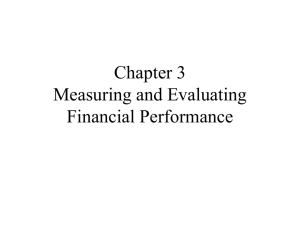Organizational Behaviour Chapter 7
advertisement
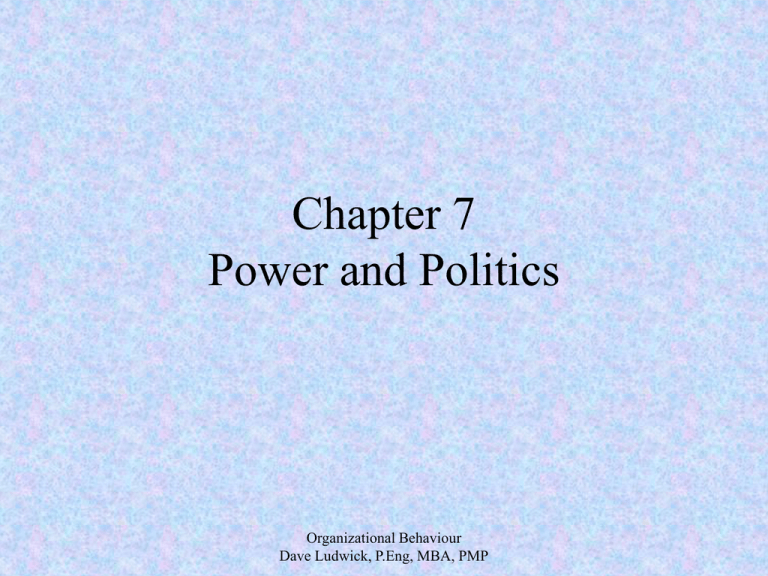
Chapter 7 Power and Politics Organizational Behaviour Dave Ludwick, P.Eng, MBA, PMP Power • A capacity to influence the behaviour of others • It is a potential that need not be actually used • It is also a function of dependency. If a person is dependent on another, then the other has power over the first • Leaders use their power as a means to achieve a goal Organizational Behaviour Dave Ludwick, P.Eng, MBA, PMP 5 Sources of Power • Coercive Power – probably the most primitive source of power, but most often used, and most difficult to control. – It is a power that is dependent on fear • Reward Power – the opposite of Coercive Power – People comply with the wishes of another because it produces positive benefits – Reward can be offered in the form of financial, but also friendship, praise and acceptance (Maslow’s third level need) • Legitimate Power – the power a person possesses as a result of their position in the organization Organizational Behaviour Dave Ludwick, P.Eng, MBA, PMP 5 Sources of Power • Expert Power – power possessed because of a specific knowledge, skill, expertise or experience an individual has – As the world has become more technical, this power source has grown • Referent power – Power resulting to a person because of desirable characteristics or resources – It develops out of admiration for the power holder – Celebrities endoursing a product in commercials are a prime example of leveraging this source of power Organizational Behaviour Dave Ludwick, P.Eng, MBA, PMP About the 5 Sources of Power • Of course, power is only given to the extent that the level of dependence is present – Individuals seek to minimize dependence by expanding their options (businesses source multiple suppliers and customers, individuals seek education to widen their attractiveness to prospective employers) • The least effective sources of power are Coercive, Legitimate and Reward • Effective leaders leverage referent power and expert power. – These are more personal forms of power achieved through interrelations with others • Q: Which of these sources do you possess? Organizational Behaviour Dave Ludwick, P.Eng, MBA, PMP 7 Ways to Increase Your Power • Be reasonable – use facts and data to build a position then reason from it • Be friendly – Create goodwill and good relations • Build coalitions – Get the support of others who possess a similar view point • Bargain – Negotiate for the exchange of benefits (to minimize dependency) • Be assertive – A little more directly forceful • Seek higher authority support – provides leverage • Leverage sanctions – use organizationally derived rewards or punishments and the threat of them to cause action Organizational Behaviour Dave Ludwick, P.Eng, MBA, PMP Empowerment • Empowerment is the ability and freedom of employees to make decisions and commitments – To some degree, boundaries are set around where employees can make decisions, and empowerment seeks to expand them • Empowered employees exhibit 4 characteristics – – – – Self-determination – free to choose their work Sense of meaning – feel their work is important Sense of competence – confident in their ability to do the work Sense of impact – believe they can influence their work unit, team or organization • Empowerment benefits management because – it reduces management work load – Places decision making power in the hands of those often better equipped to make decisions – Provides significant motivation and learning opportunities for employees Organizational Behaviour Dave Ludwick, P.Eng, MBA, PMP Empowerment • Empowerment increases as employees or teams are given more power over their job context (reason for the job) and job content (tasks) • Empowered employees are expected to act as owners of the business • Levels of Empowerment – No discretion (usually for routine, low skilled jobs) – Task setting – employee can determine how the job gets done – Participatory – some decision making power over job context/content – Mission defining – groups set broad goals for a project – Self-management – Total decision making power Organizational Behaviour Dave Ludwick, P.Eng, MBA, PMP Coalitions • A coalition is an informal group bound together by the active pursuit of a single issue • Successful coalitions contain fluid membership and act swiftly to achieve their goals • Coalitions will seek to maximize their size and are more likely to be created when there is a resource shortage or dependence • Coalitions tend to be created when tasks are routine as well Organizational Behaviour Dave Ludwick, P.Eng, MBA, PMP Abuse of Power • Harassment – the abuse of a power position • Great examples of abuse of power are in the recent Nortel, Enron and WorldCom cases. – Executives abused their ability to affect perceived organizational performance through the use of financial reporting tools • Sexual harassment is defined as “unwelcome behaviour of a sexual nature in the workplace that negatively affects the work environment or leads to adverse job related consequences for employees Organizational Behaviour Dave Ludwick, P.Eng, MBA, PMP Politics • Politics is present when employees convert their power into action • Political behaviour is that activity that attempt to influence the distribution of advantages and disadvantages within an organization • It becomes most notable when it is outside the actor’s direct job responsibility • Q: How political is your place of work? Why? Organizational Behaviour Dave Ludwick, P.Eng, MBA, PMP Why do politics exist? • Organizations are made up of people with differing values, goals and interests • Resources are limited which causes action to resolve the shortage resulting in conflict • Facts used to allocate resources are open to interpretation. – Tainting the facts, or concentrating on those facts that support an individual’s needs is possible in a world where there is always ambiguity – An example of limited resources are promotions (assuming there is limited opportunities for promotion) • The less trust there is in an organization, the more politics • Unclear performance evaluations promote politics Organizational Behaviour Dave Ludwick, P.Eng, MBA, PMP Rules for Politics • Fast Company Magazine’s Rules for Politics: – Nobody wins unless everybody wins (we’ll discuss why next chapter) – Don’t just ask for opinions, change them – Everybody expects to be paid back – Success can create opposition (what goes around comes around) • Chapter 8 Organizational Behaviour Dave Ludwick, P.Eng, MBA, PMP Organizational Behaviour Dave Ludwick, P.Eng, MBA, PMP Organizational Behaviour Dave Ludwick, P.Eng, MBA, PMP
